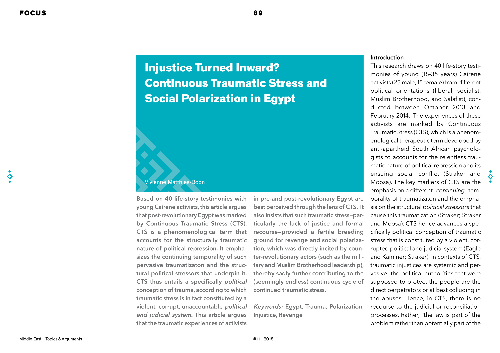Injustice Turned Inward? Continuous Traumatic Stress and Social Polarization in Egypt
Based on 40 life-story testimonies with young Cairene activists, this article argues that post-revolutionary Egypt was marked by Continuous Traumatic Stress (CTS). CTS is a phenomenological term that accounts for the structurally traumatic nature of political repression. It emphasizes the continuing...
Đã lưu trong:
| Xuất bản năm: | Middle East - Topics & Arguments |
|---|---|
| Tác giả chính: | |
| Định dạng: | Artikel (Zeitschrift) |
| Ngôn ngữ: | Tiếng Anh |
| Được phát hành: |
Philipps-Universität Marburg
2018
|
| Những chủ đề: | |
| Truy cập trực tuyến: | Truy cập trực tuyến |
| Các nhãn: |
Không có thẻ, Là người đầu tiên thẻ bản ghi này!
|
| Tóm tắt: | Based on 40 life-story testimonies with young Cairene activists, this article argues that post-revolutionary Egypt was marked by Continuous Traumatic Stress (CTS). CTS is a phenomenological term that accounts for the structurally traumatic nature of political repression. It emphasizes the continuing temporality of such pervasive traumatizaton and the structural political stressors that underpin it. CTS thus entails a specifically political conception of trauma, according to which traumatic stress is in fact constituted by a violent, corrupt, unaccountable political and judicial system. This article argues that the traumatic experiences of activists in pre-and post-revolutionary Egypt are best perceived through the lens of CTS. It also insists that such traumatic stress—particularly the lack of justice and formal recourse—provided a fertile breeding ground for revenge and social polarization, which was directly incited by counter-revolutionary actors (such as the military and Muslim Brotherhood leadership), thereby sadly further contributing to the (seemingly endless) continuous cycle of continued traumatic stress. |
|---|---|
| DOI: | 10.17192/meta.2018.11.7807 |
